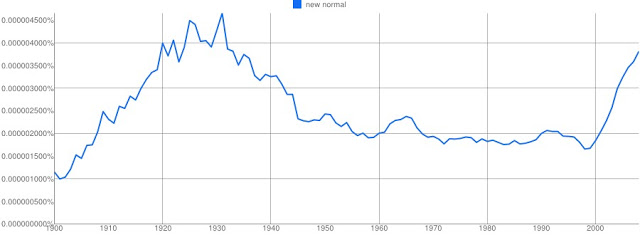Well how in Hell would any of us know about normal? I was tempted to write just that and only that, but that’s taking too easy a way out. But normal, just by it’s definition of usual, typical, unexpected, is just not very exciting Oh, an occasional normal, as in temperature, or blood pressure, can be welcome, but on the whole abnormal is surely more interesting.
And maybe I’m just feeling irritable today, but I’m really getting sick of the New Normal. I found it to be an interesting and quite clarifying phrase once upon a time, but it has been, and is, so overused that it has become …. well …. normal. On the internet, of course, it abounds, usually capitalized: the New Normal of globally aging populations, of a slower-growing U.S economy or those personal New Normals we must find after the birth of a child, or a recovery from cancer, or suffering grief.
The Economist magazine recently headed a section, ‘America and Cuba – the new normal,’ and the New York Times entitled an article, ‘Puberty Before Age 10: a New Normal?’ I have to agree with Harvard professor David Laibson who said that people are “a little trigger-happy with the ‘new normal’ label.” Well, I say to myself, new things of any kind are often over-used at first.
But wait!
This phrase is apparently not new at all: rather making a resurgence. Believe it or not, and I did indeed find it rather incredible, a New York Times article in 2011* printed a graph showing the frequency of the term [new normal – ed.] in books printed over the last century. According to this documentation, it was even more commonly used in the 1920’s and ’30’s than it is now – at least in the printed word.
Then it lay pretty dormant until zooming to it’s current popularity since around 2000.
Anyway, whatever the reason and like it or not, we appear to be destined to be inundated with New Normals at least for a while, so I’ll add my own.
WE are the New Normal. And, yes, I do most sincerely believe that. No, I don’t mean that we in the GLBT community are suddenly going to find ourselves in the majority, but that we will become, if we are not already, normal. Looking at listed synonyms, that simply means we are usual, ordinary, customary, expected, even conventional. Of course NBC tried to suggest just that with the TV series The New Normal which aired in 2012 and ’13, and more power to them, but there is nothing more powerful than the personal. It doesn’t mean we will be universally loved, approved of, even accepted. But we hardly come as a surprise, let alone a shock, to many people these days. Yes, an individual coming out may still shock unsuspecting family and friends, but we, as a group, have arrived. And as more people get to know us individually we will become more usual and ordinary and, in many cases, perhaps seen as quite conventional. I believe that this will all speed up if the Supreme Court, which has finally said it will do as it should have initially, actually makes a ruling, and in our favor.
Even gazing ahead through such rose-colored glasses, there is danger. Not for any of us older folk, I think, but for the future of our community as a whole in years to come. Will we, in fact, cease to be a community if we become more integrated into society as a whole? Worse, will we find ourselves becoming boringly, numbingly, normal; adopting all the previously straight mores and strictures of society and settling for over half of our hard won marriages ending in divorce? I so hope not. My dream is that we will form relationships and love with strengths forgotten or abandoned by our hetero friends. Perhaps they will even learn from us, and together we can all find much that has been lost, or more likely never was. Or perhaps, as several psychological studies have suggested, same-sex relationships have certain integral advantages over those of opposite-sex couples. Women will always be from Venus and men from Mars and that’s an end to it. And that, I guess, would make any same-sex couple, just, inevitably, normal.
© 2 Feb 2015
About the Author
I was born and raised in England. After graduation from college there, I moved to the U.S. and, having discovered Colorado, never left. I have lived in the Denver-Boulder area since 1965, working for 30 years at IBM. I married, raised four stepchildren, then got divorced after finally, in my forties, accepting myself as a lesbian. I have now been with my wonderful partner Betsy for 28 years.

